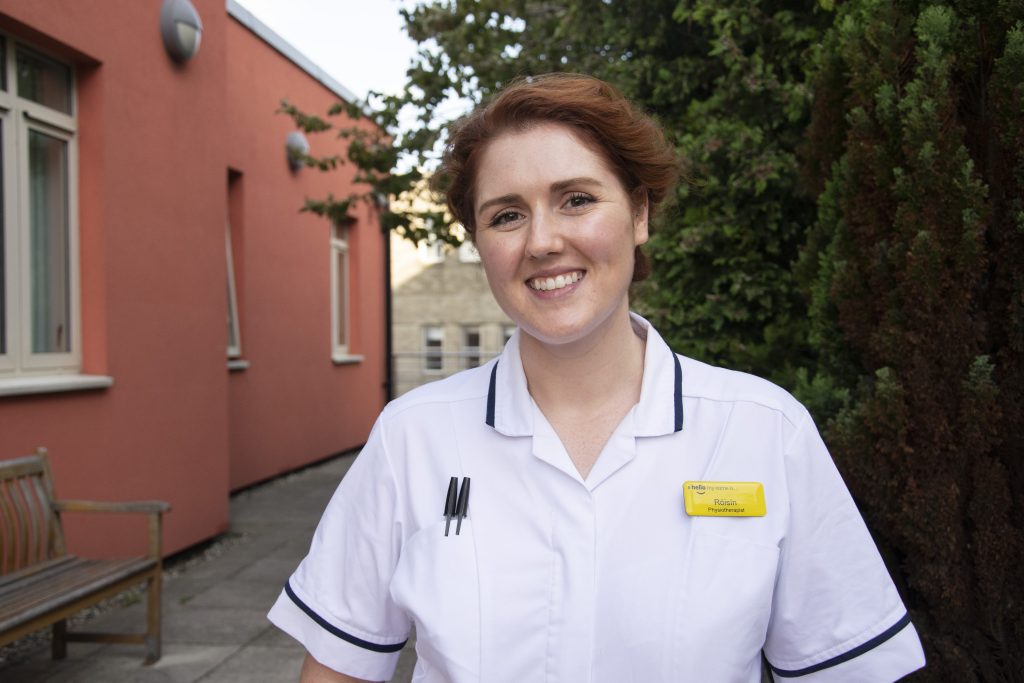
It’s a little known fact that older people can lose as much as 5% of their muscle strength for every day they are in hospital if they don’t keep active. This inevitably makes them vulnerable to hospital-associated deconditioning.
Not only that, but patients who are discharged from hospital at a lower level of physical function compared to their pre-admission ability are at a higher risk of returning to hospital within 30 days, have an increased need for social care input and are at a greater risk of falling.
Róisín Fallen-Bailey is a physiotherapist in general surgery at Newcastle Hospitals and a passionate advocate for keeping patients active while in hospital. Róisín felt that more research was needed to understand the accelerators of hospital associated deconditioning as well as the barriers to patients being more active in hospital.
There is a myth that when people are unwell or in pain they need rest to get better
Róisín Fallen-Bailey, a physiotherapist in general surgery
“As a result of these myths, we are finding an increasing number of older patients in hospital environments who do not move from their bed or bedside chair throughout their hospital stay,” explains Róisín.
In fact studies have shown that patients can spend up to 83% of their stay in bed and 12% sat in a chair which equates to 23 hours of inactivity a day. Just a 10 day period of inactivity in hospital is the equivalent to a staggering 10 years of physical ageing.
“Physiotherapy interventions alone are not sufficient to prevent hospital-associated deconditioning,” adds Róisín, “so we all need to work together to prevent people declining physically and cognitively’’.
“We can’t reverse the ageing process but we can prevent avoidable complications from inactivity by encouraging movement and supporting older people to remain active and independent in hospital.”
Róisín wanted to explore the impact of professional roles and different working practices on patient activity in hospital with a view to providing education to raise awareness of the risks of inactivity and provide practical solutions to facilitate patient activity.
Getting started
Róisín began her clinical-academic journey in 2019 to explore the barriers to older people being more physically active on the ward post-surgery as part of a quality improvement project.
The evidence from the project suggested that hospital ward staff may be inadvertently contributing to patients’ sedentary behaviours. To continue exploration of the barriers and facilitators to healthcare professionals promoting physical activity in hospital Róisín was awarded the Newcastle Hospitals’ Band 5 NMAHP Research Internship.
Róisín met mentor Dr Lisa Robinson and together they carried out an online mixed method survey exploring the multidisciplinary health care professionals’ views of promoting mobility in hospital. The results highlighted professional role boundaries and risk adverse behaviours that impact patient activity and outcomes.
In addition to identifying barriers to promoting patient activity, staff respondents also requested further education about encouraging patient mobility on the ward.
On completion of the Internship, Róisín successfully applied for funding from the Council for Allied Health Professions Research (CAHPR) to co-design a digital training resource alongside Dr Lisa Robinson and her Occupational Therapy colleague, Catherine Thomas.
The aim was to raise awareness of the benefits of adopting a coordinated multidisciplinary approach to promoting inpatient activity. Promoting awareness of the benefits of inpatient activity to newly-qualified nursing and therapy staff as part of the Newcastle Hospitals’ preceptorship programme offered some potential to influence clinical practice and support the sustainable culture change required to deliver the new service model for the 21st century set out in the NHS Long Term Plan. .
This resource is an animation called Make Movement Count.
Watch the animation on #MakeMovementCount below:
Research Capability Funding
In October 2020, Róisín was awarded Research Capability Funding from Newcastle Hospitals to prepare a high-quality, competitive NIHR pre-doctoral clinical-academic fellowship application. The protected non-clinical time provided by this award (0.5wte over 3 months) also enabled Róisín to establish a strong working relationship with her academic supervision team (Professor Tracy Finch and Dr Lisa Robinson) and to begin writing up the findings of the mixed methods survey for peer-reviewed publication.
Sharing knowledge and best practice
The video is now part of the Trust’s induction programme for all new starters including the training of healthcare assistants and volunteers. It is also available on the post-graduate doctors-in-training induction page. The video is used as part of a falls prevention programme at several trusts nationally and will be part of the regional allied health professionals’ preceptorship programme in March 2023.
It has been presented at national and international conferences including the British Geriatric Society, the Institute of Healthcare Improvement, and British Society of Gerontology. The video has been shared widely across social media platforms by NHS Improvement, NHS England and is supported by Professor Brian Dolan who set up EndPjParalysis.
Róisín has recently been appointed Associate Lecturer at Northumbria University and is teaching physiotherapy BSc and MSc students about the harms of inactivity in hospital and the benefit of collaboration within the multidisciplinary team to promote physical activity and enable movement.
Róisín has now completed her HEE/NIHR pre-doctoral clinical academic fellowship. As part of the fellowship Róisín has achieved a 1st class honours from Newcastle University for a post graduate certificate in Public Health and Health Services Research and a masters module in Implementation Science for Advanced and Chronic care at York/Hull medical school.
The pre-doctoral clinical academic fellowship has brought about a step-change in Róisín’s career trajectory by providing her with dedicated time to grow from a full-time clinician to an emerging clinical-academic leader by undertaking the research training needed to advance her programme of doctoral and post-doctoral research that will support older adults to live longer, healthier and more independent lives.